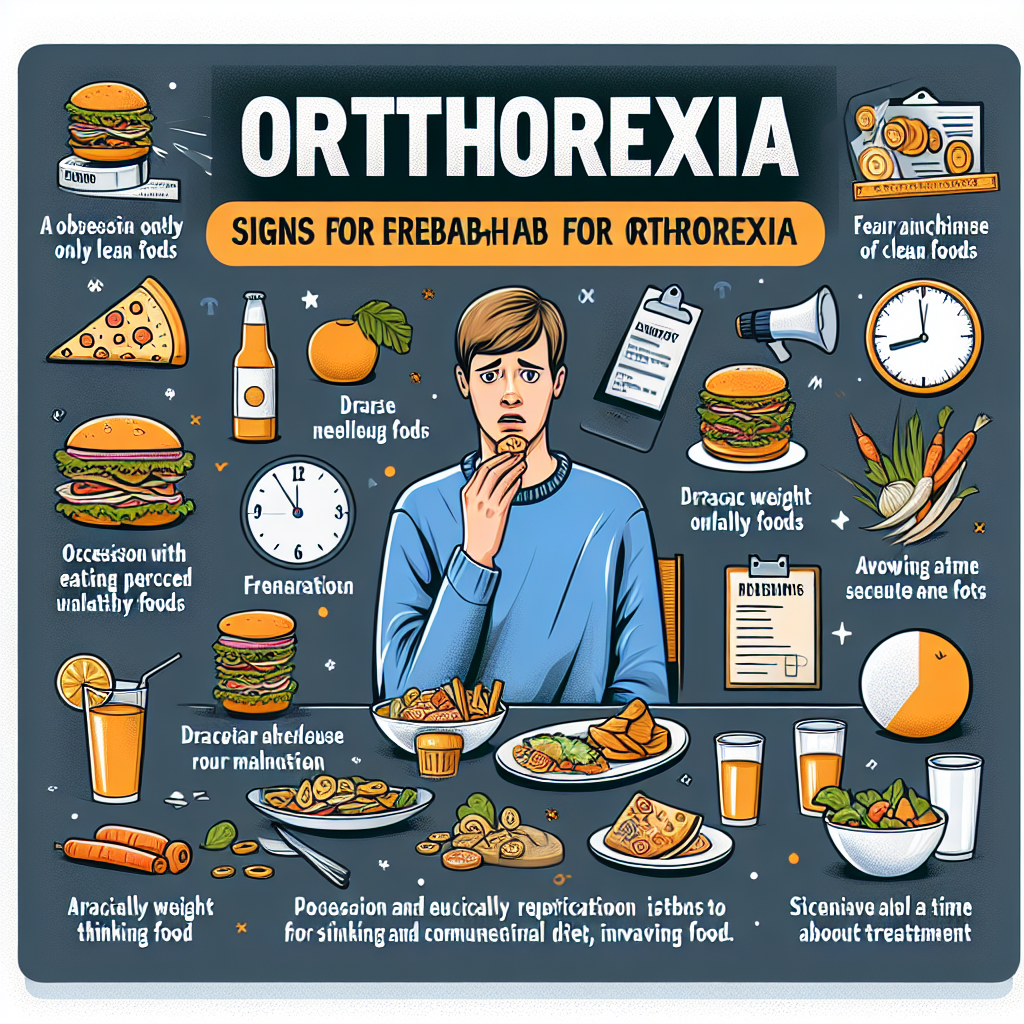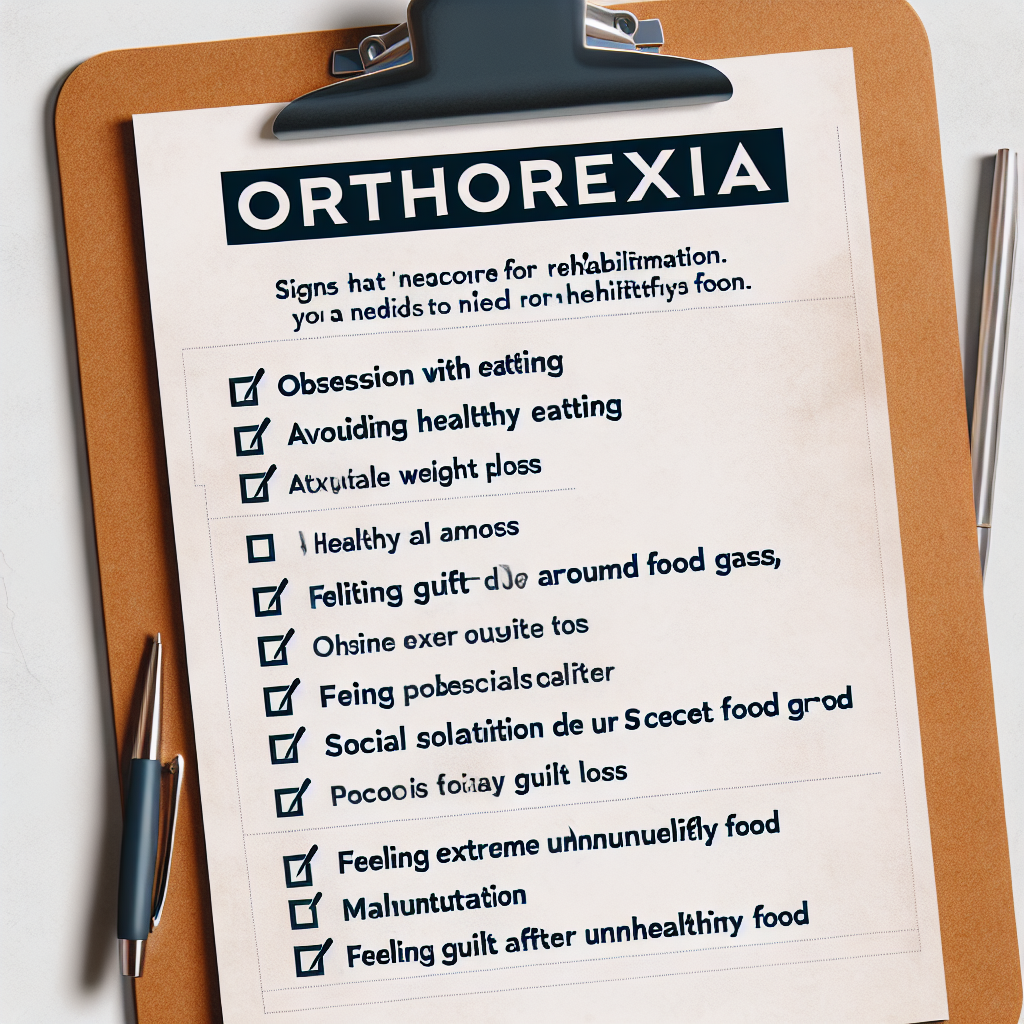-
Table of Contents

“Recognize the signs: When healthy eating becomes an obsession, it’s time to seek help for orthorexia.”
Introduction
Orthorexia, an obsession with healthy eating, can significantly impact one’s physical and mental well-being. Recognizing the signs that you may need rehab for orthorexia is crucial for seeking timely intervention and support. Key indicators include an excessive preoccupation with food quality and purity, severe anxiety or guilt when deviating from a strict diet, and social isolation due to dietary restrictions. Additionally, physical symptoms such as significant weight loss, malnutrition, or other health issues related to restrictive eating patterns may also signal the need for professional help. Understanding these signs can help individuals take the necessary steps towards recovery and a healthier relationship with food.
Recognizing The Warning Signs: When Orthorexia Requires Professional Rehab
Recognizing the warning signs that orthorexia requires professional rehab can be a crucial step towards reclaiming a balanced and healthy life. Orthorexia, an obsession with eating foods that one considers healthy, can often be masked by the seemingly positive pursuit of wellness. However, when this fixation begins to dominate one’s life, it can lead to serious physical and psychological consequences. Understanding when to seek professional help is essential for recovery and well-being.
One of the first signs that orthorexia may necessitate rehab is when the preoccupation with healthy eating starts to interfere with daily functioning. If you find yourself spending an excessive amount of time planning, researching, and preparing meals to the detriment of other activities, it may be time to seek help. This obsessive behavior can lead to social isolation, as you might avoid social gatherings or restaurants that do not meet your strict dietary standards. Consequently, relationships with family and friends can suffer, leaving you feeling lonely and disconnected.
Another indicator is the development of rigid food rules and rituals. If you feel intense anxiety or guilt when deviating from your self-imposed dietary guidelines, this could be a red flag. Such rigidity can lead to a limited diet, which may result in nutritional deficiencies and physical health issues. For instance, you might experience fatigue, dizziness, or digestive problems due to an imbalanced intake of essential nutrients. Recognizing these physical symptoms as a consequence of orthorexia is vital in understanding the need for professional intervention.
Moreover, the emotional toll of orthorexia should not be underestimated. Feelings of shame, guilt, and anxiety surrounding food choices can become overwhelming. If you notice that your self-worth is increasingly tied to your ability to adhere to your dietary rules, it is a sign that orthorexia is taking a significant psychological toll. This emotional distress can exacerbate other mental health issues, such as depression or anxiety disorders, making it even more important to seek comprehensive treatment.
Additionally, the impact of orthorexia on your overall quality of life is a crucial factor to consider. If your focus on healthy eating is causing you to miss out on experiences and opportunities that you once enjoyed, it may be time to reevaluate your relationship with food. For example, if you decline invitations to dine out with friends or avoid travel due to concerns about maintaining your diet, these are clear signs that orthorexia is limiting your life in unhealthy ways.
Recognizing these warning signs is the first step towards seeking the help you need. Professional rehab for orthorexia can provide the support and guidance necessary to develop a healthier relationship with food. Through a combination of nutritional counseling, therapy, and support groups, rehab can help you break free from the obsessive patterns of orthorexia and rediscover the joy of balanced eating. It is important to remember that seeking help is not a sign of weakness, but rather a courageous step towards reclaiming your health and happiness.
In conclusion, if you find that your pursuit of healthy eating is causing significant distress, interfering with daily life, or leading to physical and emotional health issues, it may be time to consider professional rehab for orthorexia. By recognizing these warning signs and taking proactive steps towards recovery, you can pave the way for a more balanced and fulfilling life. Remember, it is never too late to seek help and make positive changes for your well-being.
Identifying The Need For Rehab: Key Indicators Of Orthorexia
Orthorexia, an obsession with eating foods that one considers healthy, can often be difficult to identify due to its seemingly positive focus on nutrition. However, when this fixation begins to dominate one’s life, it may be time to consider the possibility of needing rehab. Recognizing the signs that you need help is the first step towards recovery and reclaiming a balanced, healthy relationship with food.
One of the primary indicators that orthorexia has taken a detrimental hold on your life is the presence of rigid food rules. If you find yourself categorizing foods strictly as “good” or “bad” and experiencing intense anxiety or guilt when deviating from these rules, it may be a sign that your eating habits have become unhealthy. This rigidity can lead to social isolation, as you might avoid social gatherings or events where you cannot control the food options. Consequently, this can strain relationships and diminish your overall quality of life.
Another key sign is the amount of time and mental energy devoted to planning, preparing, and thinking about food. If you notice that your thoughts are consumed by meal planning, grocery shopping, and researching the nutritional content of foods, it may indicate that orthorexia is taking up an unhealthy amount of your mental space. This preoccupation can interfere with your ability to focus on other important aspects of life, such as work, hobbies, and personal relationships.
Physical health can also be a telling indicator. Despite the intention to eat healthily, orthorexia can lead to nutritional deficiencies and other health issues. If you are experiencing symptoms such as fatigue, dizziness, digestive problems, or unexplained weight loss, it is crucial to consider whether your restrictive eating habits are contributing to these issues. Consulting with a healthcare professional can help determine if your diet is lacking essential nutrients and if orthorexia is the underlying cause.
Emotional well-being is another area that can be significantly impacted by orthorexia. Feelings of shame, guilt, or anxiety related to food choices can become overwhelming. If you find that your self-worth is tied to your ability to adhere to your dietary rules, it may be a sign that orthorexia is affecting your mental health. Additionally, if you experience mood swings or heightened stress levels when faced with food-related decisions, it is important to acknowledge that these emotional responses are not typical and may require professional intervention.
Recognizing these signs is a courageous step towards seeking help. It is important to understand that orthorexia, like any other eating disorder, is a serious condition that can have profound effects on both physical and mental health. Seeking rehab can provide the support and resources needed to address the underlying issues and develop a healthier relationship with food.
In rehab, you will have access to a multidisciplinary team of professionals, including dietitians, therapists, and medical doctors, who can help you navigate the complexities of orthorexia. Through a combination of nutritional education, therapy, and support groups, you can learn to challenge and change the harmful beliefs and behaviors associated with orthorexia. This journey towards recovery is not only about restoring physical health but also about reclaiming joy, freedom, and balance in your life.
Taking the step to seek rehab for orthorexia is an empowering decision that can lead to profound personal growth and healing. By addressing the signs early and seeking the necessary help, you can overcome the challenges of orthorexia and move towards a healthier, more fulfilling life.
Q&A
1. **Question:** What are some physical signs that I need rehab for orthorexia?
**Answer:** Physical signs may include significant weight loss, malnutrition, fatigue, and gastrointestinal issues due to restrictive eating habits.
2. **Question:** What are some psychological signs that I need rehab for orthorexia?
**Answer:** Psychological signs may include obsessive thoughts about food purity, anxiety or guilt when deviating from a strict diet, and social isolation due to dietary restrictions.
Conclusion
Signs that you may need rehab for orthorexia include an obsessive focus on healthy eating to the detriment of your overall well-being, severe anxiety or guilt about eating foods considered unhealthy, significant weight loss or malnutrition, social isolation due to dietary restrictions, and an inability to eat anything not prepared by yourself. If these behaviors interfere with your daily life, relationships, or physical health, seeking professional help is crucial.



